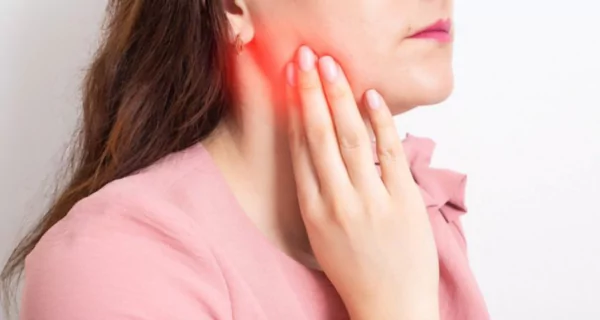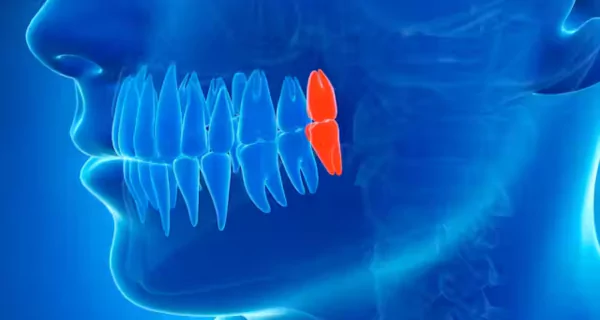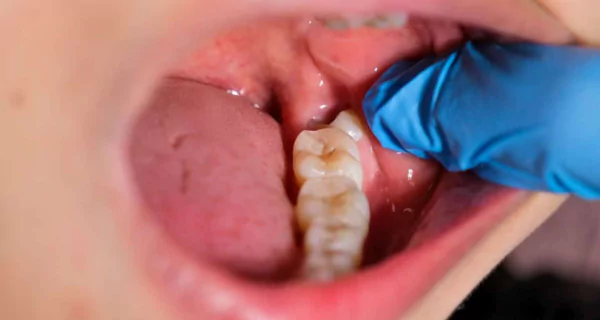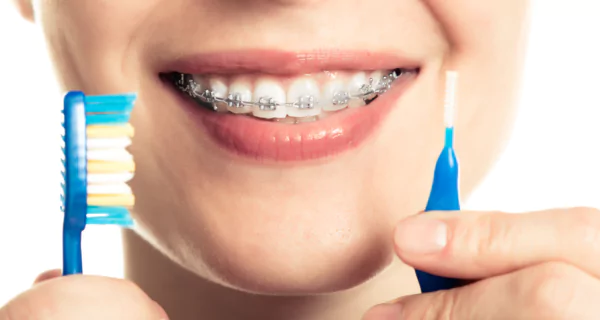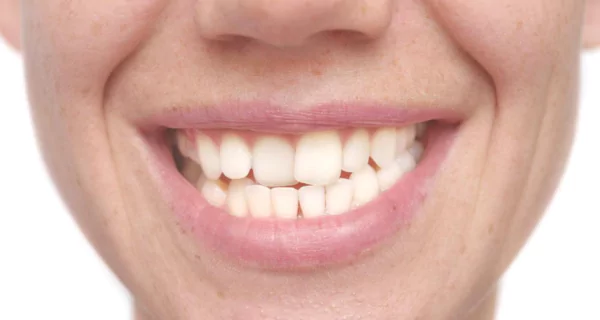Last Updated on: 19th September 2025, 12:36 pm
Can wisdom teeth cause neck pain? Learn how impacted wisdom teeth lead to neck discomfort, broader health issues, and solutions for relief.
When the last set of molars, commonly known as wisdom teeth, begin to emerge during young adulthood, they often bring a range of issues. These teeth can sometimes cause discomfort that extends beyond the mouth, potentially involving areas such as the ears, temples, and even the neck.
As these teeth develop, their impact isn’t limited to the gums or jawbone; the discomfort can spread, influencing other parts of the body. For individuals experiencing unexpected neck pain, it’s worth discerning whether problematic wisdom teeth might be contributing to the issue. Recognizing this connection can be an important step in addressing the underlying cause and finding relief.
What are wisdom teeth?
Wisdom teeth are the last adult teeth to emerge, typically appearing between the ages of 17 and 25. Located at the back of the upper and lower jaws, these teeth were once vital for our ancestors, who relied on them to grind coarse, fibrous food. However, as human diets and jaw structures evolved, wisdom teeth became less necessary, and many people today lack the space in their mouths to accommodate them. This lack of space often leads to these molars becoming impacted or growing at odd angles.
When wisdom teeth are impacted, meaning they cannot fully emerge or align properly, they can cause a range of dental problems. These issues include pain, swelling, infections, and potential damage to neighboring teeth. The pressure from these misaligned teeth also contributes to jaw discomfort and other complications, making their management crucial for maintaining oral health. Recognizing the challenges posed by wisdom teeth helps address symptoms early so that one can seek appropriate care when needed.
Why impacted wisdom teeth can cause neck pain
Impacted wisdom teeth – those that fail to fully emerge due to lack of space or improper alignment – are notorious for causing a range of complications. These issues often extend beyond the mouth, leading to discomfort in the jaw, neck, shoulders, and even the head. Understanding the mechanisms behind this pain is essential for effective management.
- Pressure and misalignment: Impacted wisdom teeth exert pressure on neighboring teeth and jaw structures. This can alter the natural alignment of the bite and jaw, causing strain on the temporomandibular joint (TMJ) and surrounding muscles. This strain often radiates pain to the neck and shoulders.
- Nerve pressure: When wisdom teeth press against the trigeminal nerve, which serves the jaw, face, and head, they can cause referred pain. This means discomfort originating in the jaw may spread to the neck, shoulders, and even the head.
- Inflammation and swelling: The body’s inflammatory response to impacted wisdom teeth can spread to surrounding tissues and muscles, including those in the neck. This inflammation could lead to stiffness, soreness, and difficulty moving the neck and jaw.
- Infections: Impacted wisdom teeth are difficult to clean, which increases the risk of bacterial infections like pericoronitis (inflammation of the gum surrounding a partially erupted tooth). Such infections can cause swelling and pain that radiate to the neck, ears, and lymph nodes. Severe infections may also result in fever and other systemic symptoms.
- Bite and jaw position changes: To avoid discomfort caused by impacted or swollen gums, the jaw may adjust to a new, unnatural position. This shift can strain the jaw joints and muscles, resulting in headaches, neck pain, and stiffness.
Recognizing wisdom tooth-related neck pain
Wisdom teeth can cause neck pain, which is often accompanied by other symptoms, including::
- Swollen or tender gums near the back of the mouth.
- Jaw stiffness or difficulty opening the mouth fully.
- Recurring headaches or facial pain radiating to the neck, shoulders, or temples.
- Signs of infection, such as redness, swelling, pus, or fever.
If you notice these symptoms alongside neck pain, it’s essential to consult a dentist for a thorough evaluation. Identifying wisdom teeth as the source of discomfort allows for timely treatment, which can include managing inflammation, treating infections, or removing the impacted teeth.
Left untreated, impacted wisdom teeth can lead to worsening pain, jaw misalignment, and systemic issues. Addressing these problems early can prevent complications, relieve discomfort, and restore proper jaw function. By seeking timely care, you can improve your overall comfort and quality of life.
Other symptoms of impacted wisdom teeth
In addition to neck pain, impacted wisdom teeth can cause a range of symptoms, including:
- Jaw pain and tenderness
- Difficulty chewing or swallowing
- Swelling in the gums or cheeks
- Earaches or sinus pressure
- Bad breath or a foul taste in the mouth
These symptoms often worsen over time if the wisdom teeth remain untreated, making early intervention critical.
At-home remedies for wisdom tooth pain
If you suspect your wisdom teeth are causing neck pain, there are several at-home remedies that may provide temporary relief while you await professional treatment.
Simple DIY remedies for wisdom tooth pain:
- Warm saltwater rinse: Mix half a teaspoon of salt in a glass of warm water. Rinse your mouth thoroughly to reduce inflammation and fight bacteria.
- Cold compress: Apply a cold pack to the side of your face or jaw to reduce swelling and numb the pain.
- Over-the-counter pain relievers: Medications like ibuprofen can help manage pain and reduce inflammation.
- Clove oil: Dab a small amount of clove oil onto a cotton ball and place it on the affected area for natural numbing effects.
When to seek professional help
While at-home remedies can be helpful, they’re not a substitute for professional care. Contact your dentist if you experience:
- Severe or persistent pain
- Swelling that doesn’t improve with cold compresses
- Signs of infection, such as fever, pus, or difficulty swallowing
- Difficulty opening your mouth or breathing
Preventing wisdom tooth complications
Not all wisdom teeth cause problems, but taking preventive measures and maintaining regular dental check-ups can help you avoid potential issues. Due to their location and difficulty in cleaning, these teeth are prone to complications such as infections, pain, and misalignment. Staying proactive in their care can protect your oral and overall health.
- Maintain good oral hygiene: Proper brushing and flossing, especially around the back of the mouth where wisdom teeth are located, can reduce the risk of infections. This includes cleaning hard-to-reach areas to prevent plaque buildup and gum inflammation. Using antibacterial mouthwash can provide additional protection.
- Monitor for changes: Pay attention to any signs of trouble, such as swelling, pain, redness, or difficulty opening your mouth. These symptoms could indicate impacted wisdom teeth or infections that require prompt dental care.
- Adopt healthy habits: A balanced diet that supports dental health and avoiding harmful habits like smoking and excessive alcohol consumption can reduce the likelihood of complications. Smoking, in particular, can increase the risk of infections and slow healing if wisdom teeth are removed.
- Regular dental check-ups: Routine visits to your dentist are essential to monitor the growth and positioning of your wisdom teeth. Dentists can use X-rays and exams to detect potential risks early, allowing for timely intervention. If wisdom teeth are likely to cause complications, your dentist may recommend their removal before symptoms develop, preventing future discomfort.
By combining regular dental care, good oral hygiene, and healthy lifestyle choices, you can significantly lower the chances of wisdom tooth-related problems and maintain a healthier smile. Proactive care today can save you from discomfort and complications in the future.
Can wisdom teeth cause other health issues?
Impacted wisdom teeth can lead to several health problems if left untreated, including:
- Infections: Gum infections around wisdom teeth can spread, leading to abscesses and systemic inflammation, which may weaken the immune system.
- Systemic fatigue: Persistent pain and inflammation can disrupt daily activities, causing fatigue and irritability.
- Mental health impacts: Chronic discomfort, difficulty eating, and poor sleep may contribute to stress, anxiety, or depression.
Promptly addressing wisdom tooth issues can alleviate physical symptoms and prevent these broader health complications.
Long-term impact of ignoring wisdom teeth
- Misalignment of teeth: Impacted wisdom teeth can push against neighboring molars, leading to crowding and bite problems.
- Damage to adjacent teeth: Pressure from impacted wisdom teeth can erode enamel on nearby teeth, increasing the risk of cavities and decay.
- Development of cysts: Untreated wisdom teeth may develop cysts or sacs filled with fluid, which can damage surrounding bone and tissues.
- Chronic inflammation and pain: Persistent inflammation can lead to ongoing discomfort, which may extend to other areas such as the neck, shoulders, or head.
- Posture issues: Chronic pain may cause unconscious adjustments in posture to alleviate tension, potentially leading to back or shoulder pain.
- Increased risk of infection: Neglected wisdom teeth are prone to infections, which can spread to other parts of the body if left untreated.
- Gum disease: Impacted wisdom teeth can create pockets in the gums where bacteria thrive, increasing the likelihood of periodontal disease.
- Difficulty in oral hygiene: Impacted or partially erupted wisdom teeth are harder to clean, promoting plaque buildup and long-term dental complications.
Addressing wisdom teeth problems early is critical to prevent these long-term impacts and maintain both oral and overall health.
Tips for preparing for wisdom tooth extraction
If your dentist recommends wisdom tooth removal, proper preparation can ensure a smoother procedure and recovery. Here’s how to get ready:
- Understand the procedure: Discuss the details with your dentist, including anesthesia options and recovery expectations.
- Stock up on soft foods: Have items like yogurt, soup, and smoothies ready for easy meals post-surgery.
- Arrange transportation: Plan for someone to drive you home, especially if sedation is used.
- Take time off: Schedule a few days to rest and recover fully.
- Follow pre-Op instructions: Follow your dentist’s advice, such as fasting before anesthesia.
- Prepare for aftercare: Learn post-op care tips, like using ice packs and saltwater rinses, to aid healing.
Staying calm, informed, and prepared can reduce anxiety and promote a quicker recovery. If complications arise, contact your dentist immediately.
Conclusion
Wisdom teeth may seem like a minor concern, but the complications they can cause, including neck pain, are far from insignificant. If you’re dealing with persistent neck discomfort – wondering “Can wisdom teeth cause neck pain?” – the answer is yes. The connection lies in the intricate network of nerves, muscles, and joints linking your jaw, face, and neck.
Impacted or problematic wisdom teeth can trigger inflammation, nerve pressure, and bite misalignment, all of which can radiate pain to the neck, shoulders, and beyond. Addressing the issue promptly with a professional evaluation and treatment is essential to alleviate pain and protect your overall health. Don’t let these late-blooming molars compromise your comfort, take action today!
Frequently Asked Questions
Can wisdom teeth cause chronic neck pain?
Why does wisdom tooth pain radiate to the neck?
How can I relieve neck pain caused by wisdom teeth?
Should I get my wisdom teeth removed if I have neck pain?
Can wisdom teeth affect posture?
Share
References
1. Bhowmik, S. (2022, june 21). TMJ and wisdom teeth: Is there a link?. Medical news today. https://www.medicalnewstoday.com/articles/tmj-wisdom-teeth
2. Sahi, A. (2023, January 17). What are Wisdom Teeth?. News Medical. https://www.news-medical.net/health/What-are-Wisdom-Teeth.aspx
3. Tusita, L. N. S., & Fischer, L. (2023, january 23). Chronic Therapy-Resistant Neck Pain in a Fifty-Year-Old Man: The Role of Partially Impacted Third Molars – Case Report and New Pathophysiological Insights. Complementary Medicine Research, 30(3), 270-274. https://doi.org/10.1159/000529293
4. WebMD staff. (2023, september 6). Dental Health and Wisdom Teeth. WebMD. https://www.webmd.com/oral-health/wisdom-teeth
-
Nayibe Cubillos M. [Author]
Pharmaceutical Chemestry |Pharmaceutical Process Management | Pharmaceutical Care | Pharmaceutical Services Audit | Pharmaceutical Services Process Consulting | Content Project Manager | SEO Knowledge | Content Writer | Leadership | Scrum Master
View all posts
A healthcare writer with a solid background in pharmaceutical chemistry and a thorough understanding of Colombian regulatory processes and comprehensive sector management, she has significant experience coordinating and leading multidisciplina...


